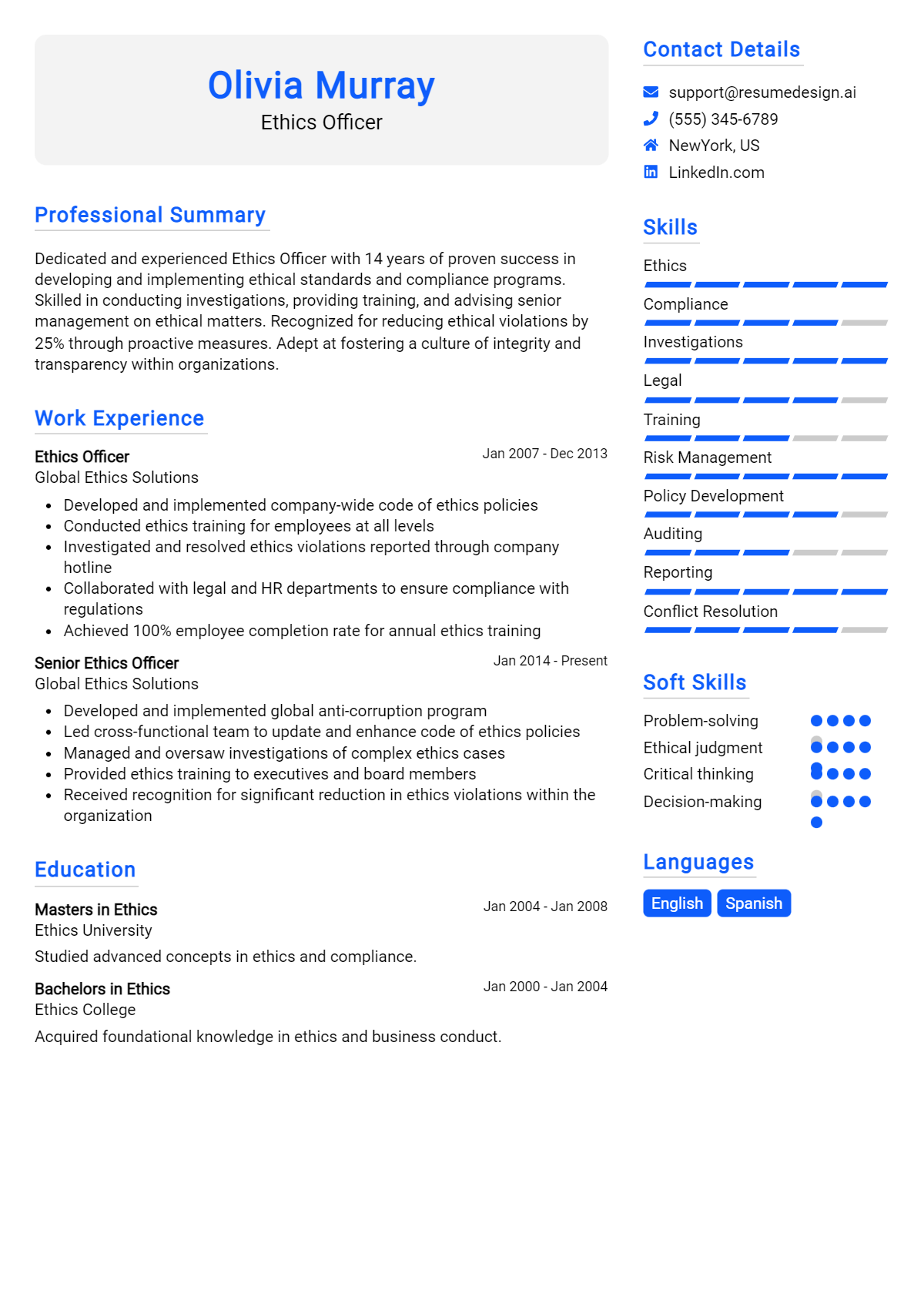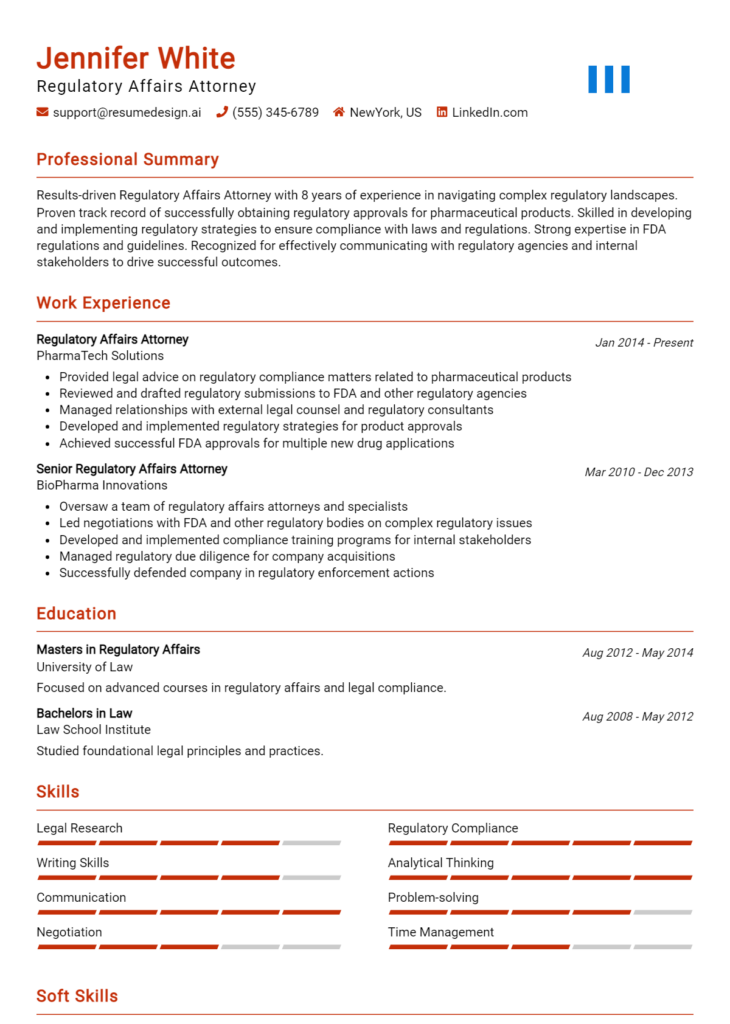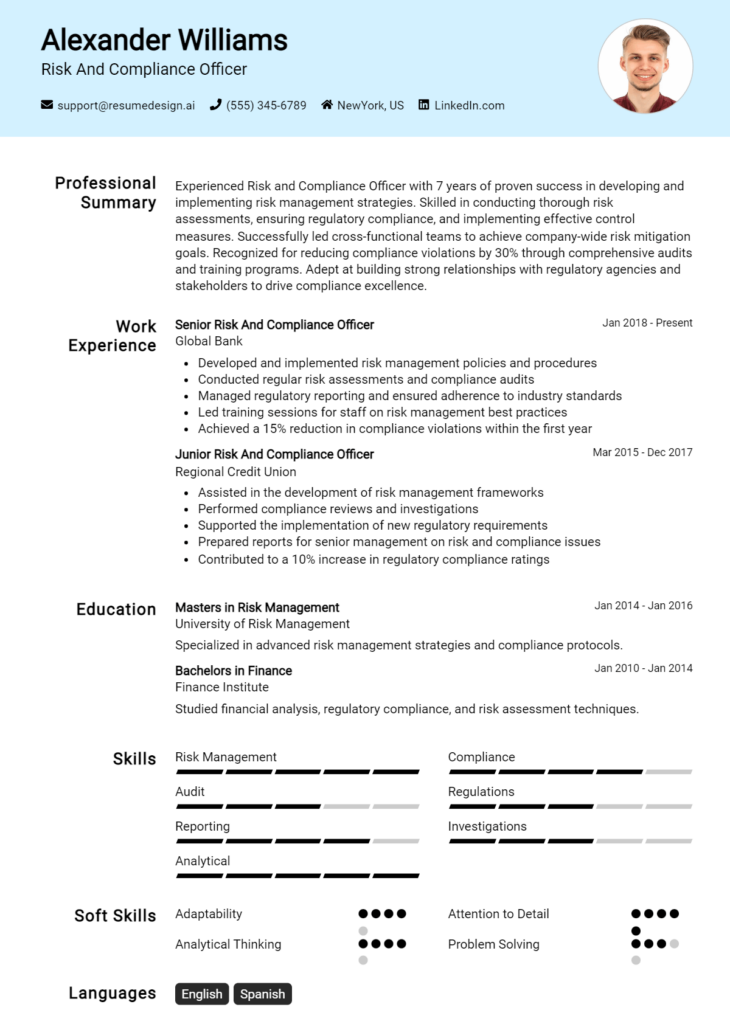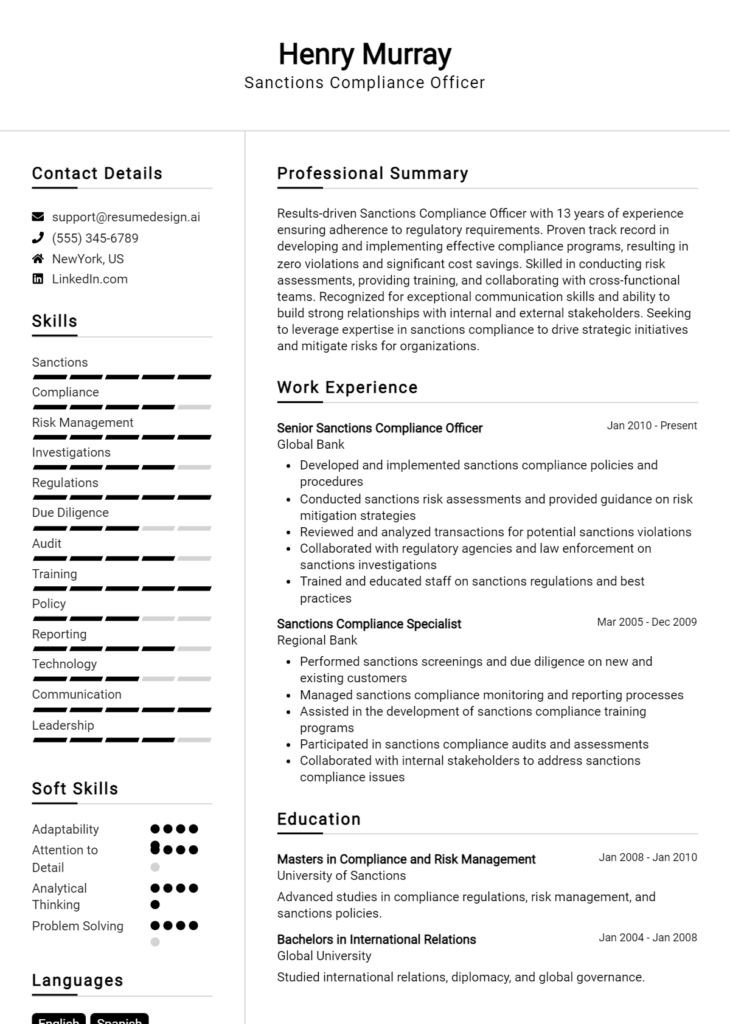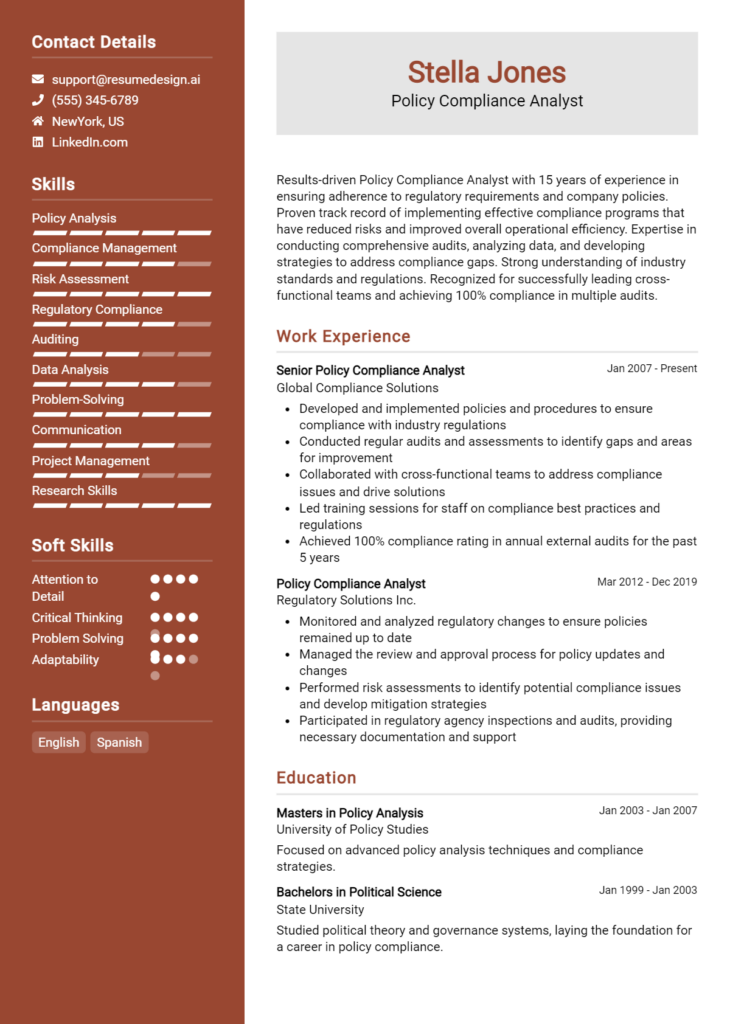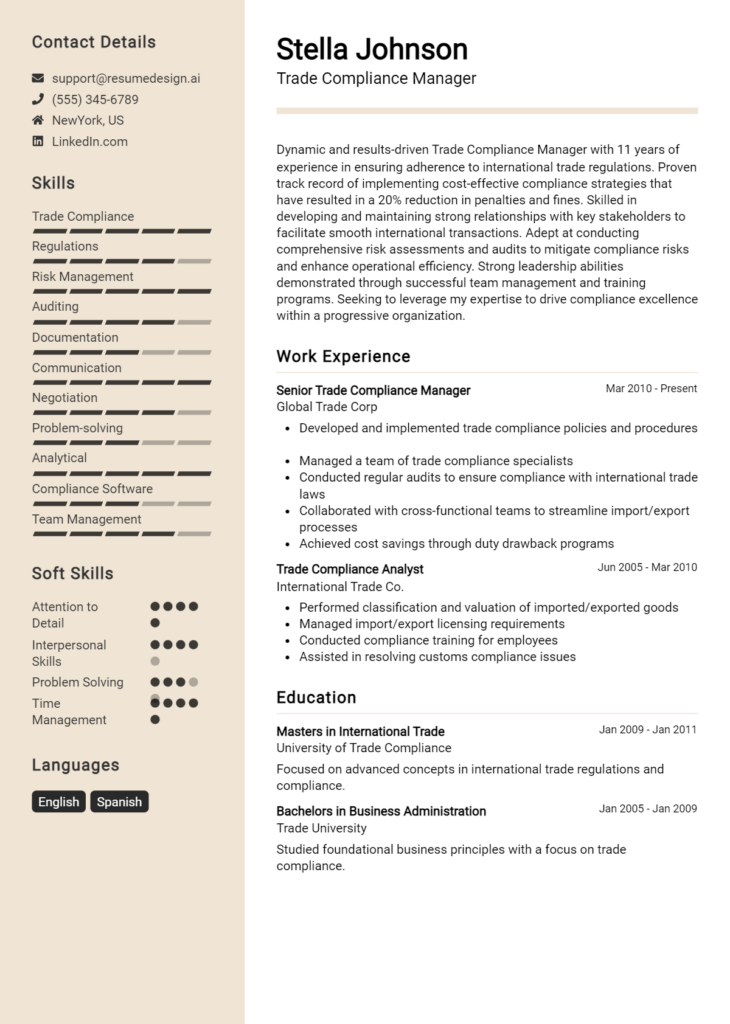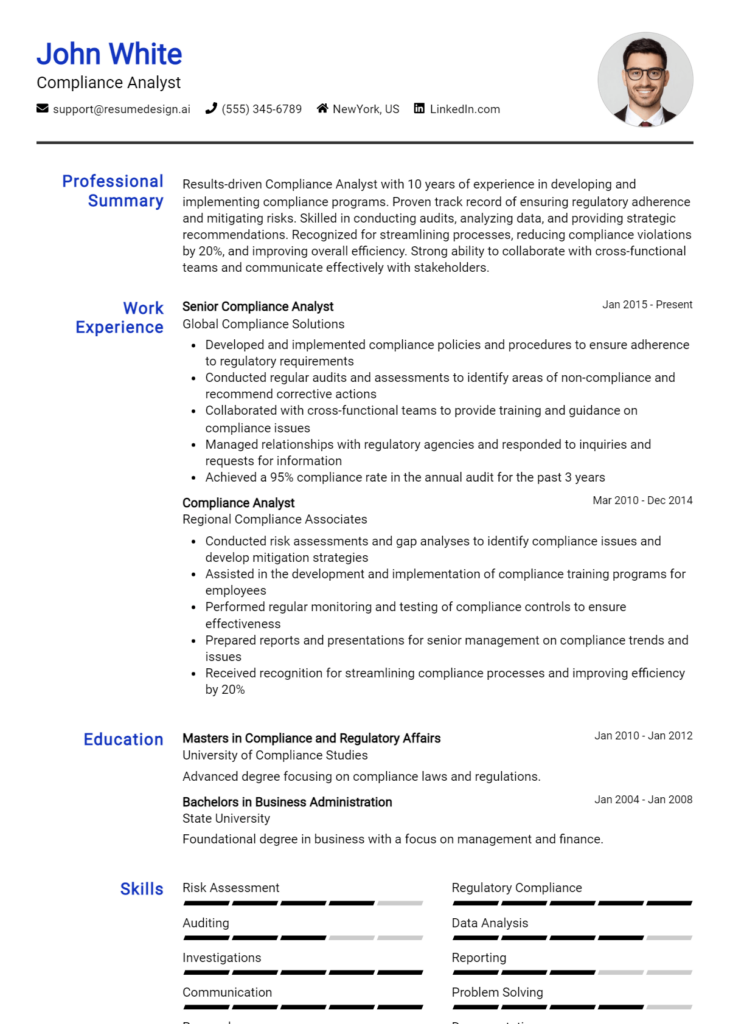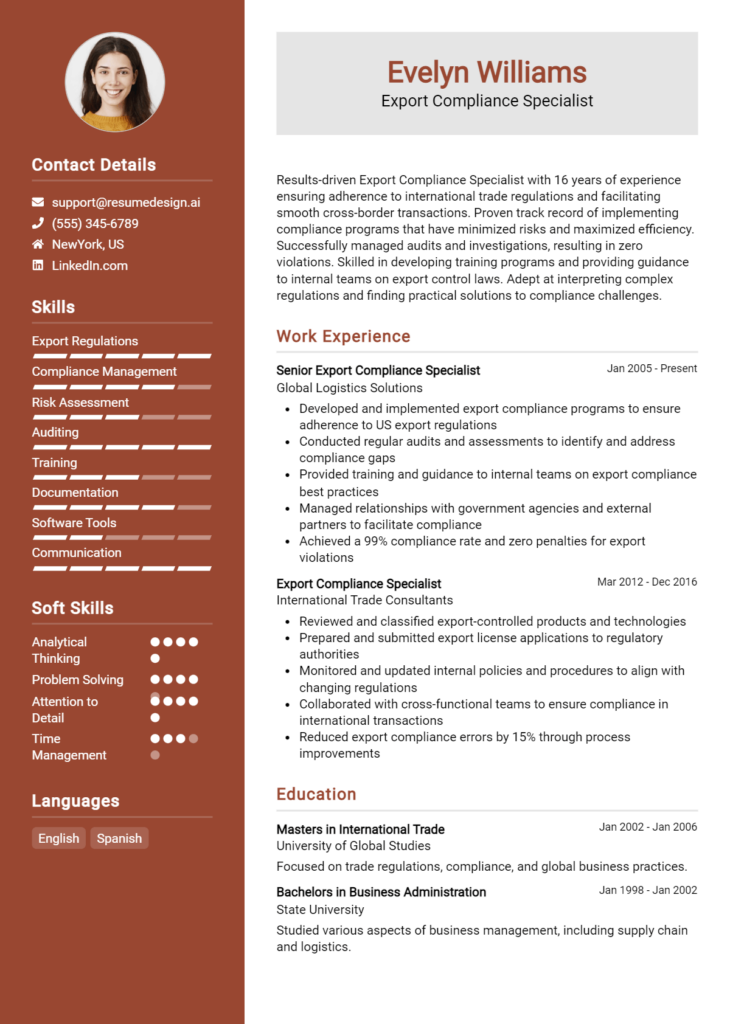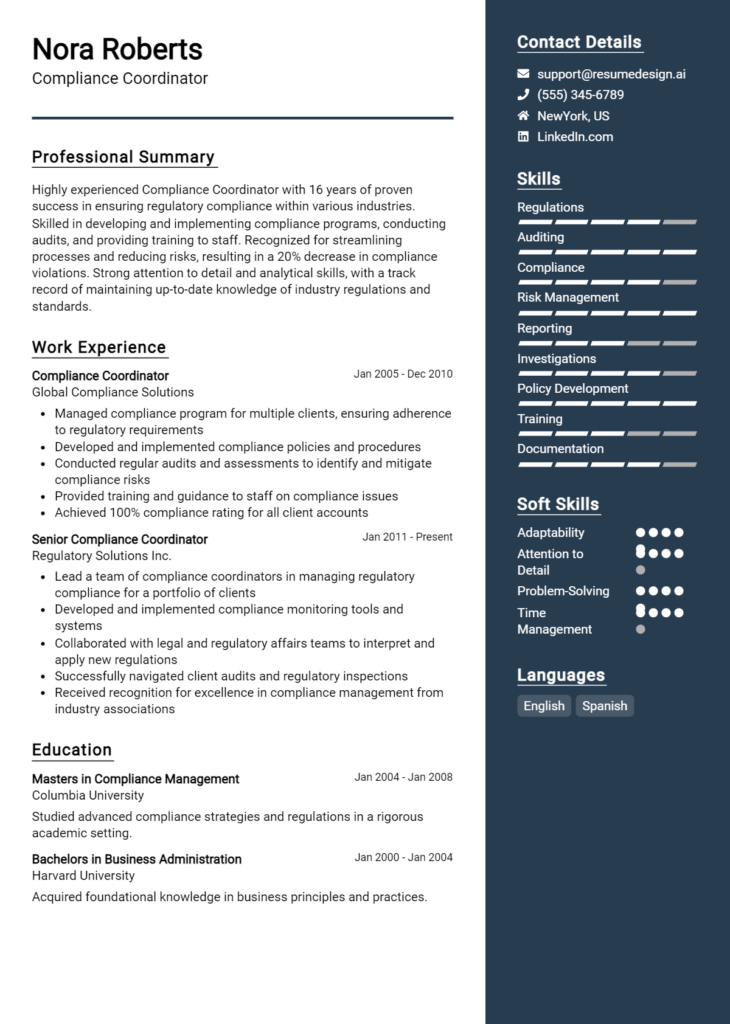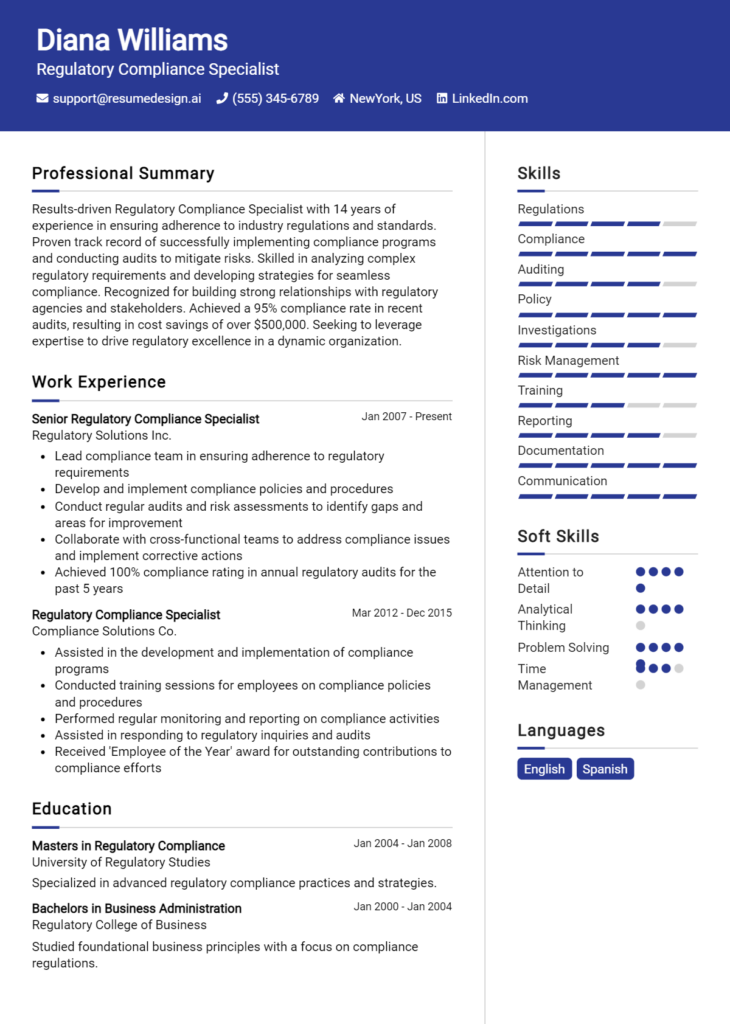Ethics Officer Core Responsibilities
An Ethics Officer plays a crucial role in fostering a culture of integrity within an organization by bridging various departments, ensuring compliance with ethical standards and regulations. Key responsibilities include developing ethical policies, conducting training sessions, and addressing ethical dilemmas. Essential skills encompass technical knowledge of regulations, operational expertise, and strong problem-solving abilities, all vital for navigating complex ethical situations. A well-structured resume can effectively highlight these qualifications, showcasing the candidate's contribution to the organization’s overarching goals.
Common Responsibilities Listed on Ethics Officer Resume
- Develop and implement organizational ethics policies and procedures.
- Conduct training programs on ethical behavior and compliance.
- Investigate ethical violations and recommend corrective actions.
- Serve as a point of contact for ethical concerns and inquiries.
- Monitor compliance with local, state, and federal regulations.
- Collaborate with various departments to promote ethical practices.
- Prepare reports on ethical issues and compliance metrics.
- Advise leadership on ethical implications of business decisions.
- Facilitate ethics committee meetings and discussions.
- Stay updated on industry best practices and legal developments.
- Assess and improve the organization’s ethical culture.
- Communicate ethical standards effectively to all employees.
High-Level Resume Tips for Ethics Officer Professionals
A well-crafted resume is crucial for Ethics Officer professionals, as it serves as the first impression a candidate makes on potential employers. Given the unique nature of this role, which blends compliance, governance, and ethical standards, it is essential that the resume not only highlights relevant skills and experiences but also demonstrates a commitment to integrity and ethical practices. In this guide, we will provide practical and actionable resume tips specifically tailored for Ethics Officer professionals, ensuring you stand out in a competitive job market.
Top Resume Tips for Ethics Officer Professionals
- Tailor your resume to match the specific job description, emphasizing relevant keywords and phrases.
- Showcase your experience in ethics-related roles, including compliance, risk management, or governance.
- Quantify your achievements by including metrics or specific outcomes to illustrate your impact.
- Highlight industry-specific certifications, such as Certified Compliance and Ethics Professional (CCEP) or Certified Internal Auditor (CIA).
- Include a summary statement that succinctly captures your professional ethos and career objectives.
- Demonstrate your understanding of regulatory frameworks, such as ISO 37001 or the Foreign Corrupt Practices Act (FCPA).
- List relevant technical skills, such as data analysis or familiarity with compliance management software.
- Incorporate soft skills such as communication, problem-solving, and decision-making that are vital for ethical leadership.
- Provide examples of how you’ve influenced organizational culture towards ethical practices.
- Keep your resume concise, ideally one page, to ensure clarity and maintain the reader's interest.
Implementing these tips can significantly increase your chances of landing a job in the Ethics Officer field. By presenting a clear, focused, and compelling resume, you can effectively communicate your qualifications and commitment to ethical standards, making a strong case for why you are the ideal candidate for the role.
Why Resume Headlines & Titles are Important for Ethics Officer
In the competitive landscape of job applications, the role of a resume headline or title holds significant importance, particularly for an Ethics Officer. A well-crafted headline can instantly capture the attention of hiring managers, providing a succinct summary of a candidate's core qualifications and unique value proposition in just a few impactful words. This brief yet powerful statement should be concise, relevant, and directly aligned with the job being pursued, allowing candidates to stand out in a crowded field and set the tone for the rest of their resume.
Best Practices for Crafting Resume Headlines for Ethics Officer
- Keep it concise—aim for one impactful phrase.
- Be specific about your role to avoid vagueness.
- Highlight key qualifications or skills relevant to the position.
- Use strong action verbs to convey your contributions.
- Incorporate industry-specific terminology to demonstrate knowledge.
- Tailor the headline to the specific job description for maximum relevance.
- Avoid clichés and generic phrases that do not differentiate you.
- Consider including measurable achievements when possible.
Example Resume Headlines for Ethics Officer
Strong Resume Headlines
Dedicated Ethics Officer with 10+ Years in Compliance and Risk Management
Proven Track Record in Developing and Implementing Ethical Guidelines for Corporations
Results-Driven Ethics Leader Specializing in Regulatory Compliance and Corporate Governance
Weak Resume Headlines
Ethics Officer Looking for a Job
Experienced Professional Seeking Opportunities in Ethics
Strong headlines are effective because they communicate the candidate's specific expertise and accomplishments in a way that resonates with hiring managers, immediately establishing credibility and interest. In contrast, weak headlines fail to impress due to their generic nature and lack of specificity, making it difficult for employers to gauge the candidate's qualifications or differentiate them from others. A compelling headline not only piques interest but also sets a strong foundation for the resume's content that follows.
Writing an Exceptional Ethics Officer Resume Summary
A well-crafted resume summary is crucial for an Ethics Officer, as it serves as the first impression for hiring managers reviewing applications. This brief yet impactful paragraph quickly captures attention, showcasing the candidate's key skills, relevant experience, and notable accomplishments in the field of ethics and compliance. A strong summary not only highlights the candidate's qualifications but also aligns with the specific requirements of the job role, making it easier for hiring managers to see why the candidate is a perfect fit for their organization. Therefore, it should be concise, powerful, and tailored to resonate with the values and needs of the prospective employer.
Best Practices for Writing a Ethics Officer Resume Summary
- Quantify achievements: Use numbers and metrics to demonstrate your impact in previous roles.
- Focus on skills: Highlight key skills that are directly relevant to the ethics officer position.
- Tailor the summary: Customize your summary for each job application to reflect the specific job description and company culture.
- Be concise: Keep your summary to 2-3 sentences to maintain clarity and focus.
- Use strong action verbs: Start sentences with dynamic verbs to convey confidence and proactivity.
- Highlight relevant experience: Mention specific roles or projects that showcase your expertise in ethics and compliance.
- Showcase soft skills: Include interpersonal skills like communication and conflict resolution that are vital for an ethics officer.
- Maintain a professional tone: Ensure your summary reflects a high level of professionalism suitable for the ethics field.
Example Ethics Officer Resume Summaries
Strong Resume Summaries
Results-driven Ethics Officer with over 10 years of experience in developing and implementing compliance programs, leading to a 30% reduction in ethical violations within the organization. Proven track record in conducting risk assessments and training staff on ethical practices.
Dedicated Ethics Officer with a robust background in corporate governance and a Master's in Ethics. Successfully spearheaded initiatives that improved compliance reporting efficiency by 40%, ensuring adherence to regulatory standards across multiple departments.
Ethics Officer with a passion for integrity and transparency, recognized for establishing a whistleblower program that increased reporting by 50% in one year. Expertise in policy development and employee training on ethical standards.
Weak Resume Summaries
Experienced professional in ethics and compliance looking to contribute to a company.
Ethics Officer with a background in various roles, seeking new opportunities to help organizations with compliance.
The strong resume summaries stand out because they provide quantifiable achievements and specific skills relevant to the Ethics Officer role, demonstrating the candidate's impact and expertise. In contrast, the weak summaries are vague and lack detail, failing to convey the candidate's qualifications effectively. Without specific results or a clear connection to the job role, these summaries do not capture the attention of hiring managers or showcase the candidate's potential contributions.
Work Experience Section for Ethics Officer Resume
The work experience section of an Ethics Officer resume is pivotal in demonstrating a candidate's technical skills and their capacity to manage teams effectively while delivering high-quality results. This section serves as a narrative of the candidate's career journey, highlighting how their expertise aligns with the ethical standards and best practices within the industry. By quantifying achievements and showcasing specific accomplishments, candidates can illustrate their impact and relevance in the field, making it crucial to align their experiences with industry benchmarks.
Best Practices for Ethics Officer Work Experience
- Clearly articulate your role and responsibilities within each position to demonstrate leadership capabilities.
- Use quantifiable metrics to highlight achievements, such as percentage reductions in compliance violations or improvements in ethical training participation rates.
- Emphasize collaboration by detailing cross-departmental projects and teamwork that contributed to ethical initiatives.
- Focus on specific technical skills relevant to the ethics field, including risk assessment, policy development, and compliance auditing.
- Align your experiences with industry standards by showcasing your familiarity with relevant regulations and ethical frameworks.
- Incorporate action verbs to convey a proactive approach and ownership over your work.
- Tailor your experiences to the job description, ensuring that the most relevant information stands out.
- Maintain clarity and brevity, avoiding jargon that may confuse readers unfamiliar with specific terms.
Example Work Experiences for Ethics Officer
Strong Experiences
- Led a cross-functional compliance team that achieved a 30% reduction in ethical breaches over two years by implementing a comprehensive training program.
- Developed and executed a new ethics policy framework that increased employee reporting of unethical behavior by 25%, fostering a culture of transparency.
- Conducted regular audits that identified key risk areas, resulting in a 40% improvement in compliance with industry regulations and standards.
- Collaborated with senior management to integrate ethical considerations into strategic planning, influencing key decisions that aligned with corporate social responsibility goals.
Weak Experiences
- Worked on various ethics-related tasks without specifying outcomes or contributions made.
- Assisted in training sessions that were not linked to measurable improvements in ethical behavior.
- Participated in compliance audits without detailing the significance of findings or personal involvement.
- Supported the ethics team in day-to-day operations without highlighting any leadership or initiative taken.
The examples of strong experiences are considered effective because they provide specific, quantifiable outcomes that illustrate the candidate's impact and leadership in the ethics field. They highlight a clear connection between actions taken and results achieved, showcasing technical expertise and collaborative efforts. Conversely, the weak experiences lack detail and measurable results, making it difficult to assess the candidate's contributions and effectiveness in previous roles. This vagueness can diminish the overall strength of the resume and fail to capture the attention of hiring managers.
Education and Certifications Section for Ethics Officer Resume
The education and certifications section of an Ethics Officer resume is critical as it underscores the candidate's academic foundation, relevant certifications, and commitment to ongoing professional development. This section serves to validate the candidate's qualifications and demonstrates their understanding of ethical standards and practices essential for the role. By including pertinent coursework, industry-recognized certifications, and specialized training programs, candidates can significantly enhance their credibility and showcase their alignment with the requirements of the Ethics Officer position, thereby increasing their chances of standing out in a competitive job market.
Best Practices for Ethics Officer Education and Certifications
- Focus on relevant degrees, such as in ethics, law, or business administration, that demonstrate a strong foundation in ethical principles.
- List certifications that are recognized within the industry, such as Certified Compliance and Ethics Professional (CCEP) or Certified Ethical Hacker (CEH).
- Include any continuing education courses that relate to ethics, compliance, and regulatory standards to showcase a commitment to lifelong learning.
- Detail specific coursework that aligns with the responsibilities of an Ethics Officer, such as corporate governance or risk management.
- Highlight advanced degrees, such as a Master’s in Business Ethics or a Juris Doctor (JD), that provide deeper insights into ethical decision-making.
- Utilize clear formatting and organization to ensure easy readability and quick reference for hiring managers.
- Incorporate any relevant workshops or training seminars attended that enhance the skill set necessary for the role.
Example Education and Certifications for Ethics Officer
Strong Examples
- M.S. in Business Ethics from XYZ University, Graduated May 2022
- Certified Compliance and Ethics Professional (CCEP), 2023
- Coursework in Corporate Governance and Ethical Leadership, XYZ University
- Certificate in Risk Management and Compliance, ABC Institute, 2021
Weak Examples
- Bachelor’s in Philosophy from DEF College, 1999 (not relevant to the role)
- Certification in Basic Computer Skills, 2020 (not industry-specific)
- High School Diploma, 1995 (insufficient educational level)
- Outdated Certificate in General Management, 2010 (not relevant to ethics)
The strong examples are considered effective because they directly relate to the skills and knowledge required for the Ethics Officer position, showcasing current and relevant qualifications that align with industry standards. In contrast, the weak examples are less effective as they either lack relevance to the ethics field, are outdated, or reflect an insufficient educational background for the role, which could undermine the candidate's credibility and suitability for the position.
Top Skills & Keywords for Ethics Officer Resume
As an Ethics Officer, possessing the right blend of skills is crucial for effectively navigating the complexities of organizational ethics and compliance. A well-crafted resume that highlights both hard and soft skills can significantly enhance your chances of securing a position in this vital role. Skills not only demonstrate your expertise and qualifications but also showcase your ability to communicate, collaborate, and lead within an organization. Highlighting your skills effectively can give potential employers insight into your capability to uphold ethical standards and foster a culture of integrity. For more information on how to showcase your skills, check out this skills guide.
Top Hard & Soft Skills for Ethics Officer
Soft Skills
- Strong communication skills
- Critical thinking
- Problem-solving abilities
- Leadership and team management
- Conflict resolution
- Emotional intelligence
- Adaptability and flexibility
- Interpersonal skills
- Negotiation skills
- Attention to detail
- Integrity and honesty
- Cultural awareness
- Empathy
- Active listening
- Collaboration
- Time management
- Persuasiveness
Hard Skills
- Knowledge of compliance regulations
- Risk assessment and management
- Data analysis and reporting
- Policy development and implementation
- Investigative techniques
- Familiarity with ethical frameworks
- Training and development expertise
- Proficiency in ethical decision-making models
- Understanding of corporate governance
- Regulatory compliance knowledge
- Audit and monitoring skills
- Familiarity with whistleblower protections
- Experience with ethics program management
- Legal research capabilities
- Crisis management skills
- Technical proficiency in compliance software
- Project management skills
By emphasizing both your soft and hard skills, you can create a compelling resume that highlights your qualifications and aligns with the expectations of employers in the field of ethics. Additionally, showcasing your work experience in relation to these skills can further solidify your candidacy for an Ethics Officer position.
Stand Out with a Winning Ethics Officer Cover Letter
Dear [Hiring Manager's Name],
I am writing to express my interest in the Ethics Officer position at [Company Name], as advertised on [where you found the job posting]. With a robust background in corporate ethics and compliance, combined with my passion for fostering ethical practices within organizations, I am confident in my ability to contribute positively to your team. My experience in developing and implementing comprehensive ethical frameworks aligns well with [Company Name]'s commitment to maintaining integrity and transparency in its operations.
In my previous role as a Compliance Analyst at [Previous Company Name], I successfully led initiatives to enhance the organization's compliance program, which involved conducting thorough risk assessments and developing training programs tailored to various departments. My efforts resulted in a 30% increase in employee awareness of ethical standards and regulatory requirements. I have a keen eye for identifying potential ethical dilemmas and have worked closely with cross-functional teams to create solutions that promote a culture of accountability and respect.
I am particularly drawn to the mission of [Company Name] to [specific mission or value of the company], and I believe my proactive approach and strong analytical skills will be assets in furthering your ethical objectives. I am adept at fostering open communication and collaboration among stakeholders, which I believe is essential for cultivating trust and ensuring adherence to ethical standards across all levels of the organization. I am excited about the opportunity to bring my expertise in ethics and compliance to [Company Name] and to contribute to the ongoing success of your ethical initiatives.
Thank you for considering my application. I look forward to the opportunity to discuss how my background, skills, and enthusiasms align with the goals of [Company Name]. I am eager to contribute to an organization celebrated for its commitment to ethical excellence and to help cultivate an environment where integrity and transparency are at the forefront.
Sincerely,
[Your Name]
[Your Contact Information]
Common Mistakes to Avoid in a Ethics Officer Resume
When crafting a resume for the position of Ethics Officer, it's essential to present yourself as a candidate who embodies integrity and professionalism. However, many applicants make common mistakes that can undermine their qualifications or fail to communicate their commitment to ethical standards. Recognizing and avoiding these pitfalls can significantly enhance your chances of landing an interview. Here are some common mistakes to steer clear of:
Vague Job Descriptions: Using general terms rather than specific achievements can make your experience seem less impactful. Instead, focus on quantifiable outcomes and specific responsibilities in previous roles.
Ignoring Relevant Certifications: Failing to mention certifications related to ethics, compliance, or governance can be a missed opportunity. Highlighting these credentials can demonstrate your commitment to the field.
Lack of Tailoring: Submitting a generic resume without tailoring it to the specific job description can detract from your application. Customize your resume to reflect the skills and experiences that align with the position.
Omitting Soft Skills: Ethics Officers need strong interpersonal and communication skills. Neglecting to showcase these soft skills can leave a gap in your portrayal as a suitable candidate.
Overlooking Professional Development: Not including ongoing education or training related to ethics can suggest a lack of commitment to professional growth. Mention workshops, seminars, or courses that enhance your expertise.
Excessive Jargon: While industry-specific terminology can demonstrate knowledge, overusing jargon can alienate readers. Aim for clarity and accessibility in your language to ensure your resume is easily understood.
Neglecting Formatting: A cluttered or unprofessional format can distract from your qualifications. Use clear headings, bullet points, and consistent formatting to create an organized and visually appealing resume.
Failure to Proofread: Typos and grammatical errors can undermine your credibility. Always thoroughly proofread your resume to present a polished and professional image.
Conclusion
As an Ethics Officer, your role is crucial in fostering a culture of integrity and ethical decision-making within an organization. Key responsibilities include developing and implementing ethical policies, conducting training sessions, and ensuring compliance with laws and regulations. You must also be adept at identifying potential ethical dilemmas and addressing them proactively.
In summary, the position of an Ethics Officer demands a strong understanding of ethical frameworks, excellent communication skills, and the ability to navigate complex situations. As you prepare to advance your career in this vital field, it's essential to ensure that your resume reflects your qualifications and experiences effectively.
Take a moment to review your Ethics Officer resume and consider utilizing available tools to enhance it. You can find resume templates to guide your layout, a resume builder for streamlined creation, resume examples for inspiration, and cover letter templates to complement your application. Investing time in refining your resume could significantly impact your job search success. Start today!

